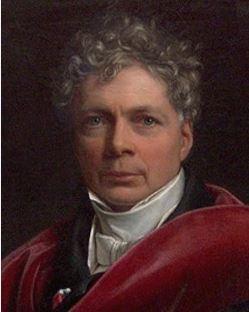Friedrich Wilhelm Joseph Schelling

Friedrich Wilhelm Joseph Schelling (1775–1854) was an important German philosopher and a central figure in German idealist philosophy in the late 18th and early 19th centuries. Schelling is known for his profound and innovative ideas on natural philosophy, metaphysics, and the philosophy of mind. He was a contemporary and intellectual opponent of Georg Wilhelm Friedrich Hegel and had a significant influence on the development of modern philosophy.
Biography:
Schelling was born in 1775 in Leonberg, a town in Württemberg, and initially studied at the University of Tübingen, where he met Hegel and Johann Gottlieb Fichte. Initially, he was influenced by Fichte's philosophy of the subject before pursuing his own philosophical path. Schelling had a long career as a professor, including in Jena, Würzburg, and Munich.
His thought went through several phases of development, from early natural philosophy to transcendental philosophy to a more religious-spiritual approach in his later years.
Central Themes and Contributions:
Natural Philosophy:
Schelling began his philosophical career as a proponent of natural philosophy, which he understood as a theory of the unity of nature and spirit. He sought to explain the natural world not only as a collection of physical objects, but also to include the spiritual and organic dimensions of nature.
He postulated that nature must be understood as a living, evolving unity shaped by a deeper spiritual force or abstract principle. Natural phenomena are the expression of a deeper "philosophical substance."
In his "System der gesammten Philosophie" (1804), he linked the concept of nature with metaphysical ideas and coined the notion that nature is a living organism permeated by a higher spiritual principle.
Philosophy of the Subject:
Schelling developed an alternative concept to Fichte's transcendentalism by addressing the unity of subject and object. While Fichte viewed the subject as the central element of reality, Schelling saw reality as an interplay of subjective and objective principles.
In "The Philosophy of Identity" (1804), he argued that subject and object do not exist in isolation, but rather interpenetrate one another, thus forming an absolute principle of being.
The concept of the "Absolute":
Schelling understood the Absolute as the infinite, indivisible principle that encompasses both nature and spirit. He attempted to develop a philosophy that could overcome the opposition between idealism and materialism by uniting the two.
For Schelling, the Absolute is not merely an abstract concept, but a living reality expressed in the world of nature and spirit. This idea had a profound impact on later philosophy, particularly on Hegel's dialectic and Heidegger's existential philosophy.
Schelling's Confrontation with Hegel:
Initially, Schelling and Hegel were close friends and shared thinkers within German Idealism. However, later their philosophies diverged significantly.
While Hegel emphasized his philosophy of absolute spirit, manifested in history and the social world, Schelling focused more on the mystical and organic dimension of reality. For Schelling, the Absolute was a dynamic principle of nature that operated not only in intellectual history but also in the material world.
Later Philosophy and Transcendental Philosophy:
In his later years, Schelling leaned more toward a transcendental and religious philosophy. He intensively explored the topics of religion, metaphysics, and theology.
In his "Philosophy of Revelation" (1827), he attempted to create a systematic connection between philosophy and religion. For Schelling, faith was a necessary complement to reason, and truth could only be achieved through a synthesis of the two. He saw the Christian religion as a system consistent with both rational philosophy and spiritual experience.
Schelling's Influence on Romanticism:
Schelling also had a tremendous influence on German Romanticism, particularly on thinkers such as Friedrich Schlegel and Novalis. They appreciated his emphasis on the unity of nature and spirit, the creative power of art, and the mystical dimension of life.
The Romantics were interested in Schelling's ideas because he valued individualism and subjective experience and sought to understand the deeper meaning of life and nature.
Later Years and Philosophical Significance:
In his later years, Schelling largely withdrew from academia and spent his final years in Munich, where he worked on a complete philosophical edition of his works.
Although his influence was significant in the early 1800s, particularly during the period of German Idealism, his philosophy declined in popularity after the rise of Hegel and the Hegelian School. Today, however, Schelling is increasingly recognized as one of the central figures of German Idealism.
Summary:
Friedrich Wilhelm Schelling was a creative and complex thinker whose philosophy represents a profound exploration of fundamental questions of nature, spirit, and the Absolute. He attempted to develop a philosophy that could overcome the duality of spirit and nature and demonstrate the unity of reality. His influence on the German Idealism movement, Romantic literature, and later existential philosophy is immeasurable, and his works still offer valuable insights into questions of freedom, consciousness, and truth.

